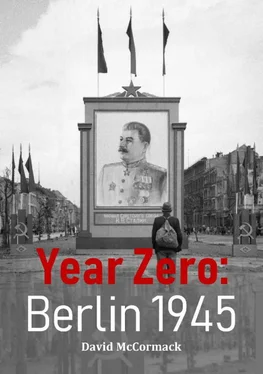On the evening of 31 March, Eisenhower’s delayed message was at last handed over to Stalin, who after reading it, conferred with Marshal Georgy Zhukov, General Aleksei I. Antonov and General Sergei M. Shtemenko. Whilst Stalin considered that Eisenhower’s planning ‘seemed good’, there remained serious doubts as to the real intentions of the Western Allies. Only the day before, General Antonov had sent a barbed message to General Deane, berating the Americans for supposedly misleading the Soviet High Command ( Stavka ). To understand the degree of mistrust, it is worth quoting the message in extensio:
On February 20 of this year I received a message from General Marshall that the Germans were deploying two groups for a counter-offensive on the Eastern Front: one in Pomerania for an attack against Thorn and another in the Vienna – Moravska – Ostrava area for an offensive towards Lodz. The southern group was to include the SS 6 thPanzer Army. A similar report was received on February 12 from the head of the army section of the British military mission Colonel Brinkman.
I am extremely grateful to General Marshall for the information intended to help attain our common goals which he so graciously offered us. However, I am compelled to inform him that the military actions on the Eastern Front failed to confirm the information communicated, because the fighting has shown that the main group of German troops, including the SS 6 thPanzer Army, was deployed not in Pomerania and not in the Moravska – Ostrava area, but in the Lake Balaton Region. From here, the Germans advanced with the aim of reaching the Danube and force-crossing it south of Budapest. This fact shows that the information General Marshall has used did not correspond to the actual course of events on the Eastern Front in the month of March.
It is not to be deduced that certain sources of that information were specifically intended to confuse the Soviet High Command and in doing so divert attention away from the area the Germans were preparing for their main operation on the Eastern Front.
Despite the above, I request General Marshall, if possible, to continue communicating available information concerning the enemy. I regard it as my duty to send this message to General Marshall exclusively so that he would be able to draw the relevant conclusions regarding the source of that information…
Whilst Antonov’s message betrays the depth of suspicion in the Soviet camp, Stalin nonetheless agreed with the general thrust of Eisenhower’s plan, as he too believed in the probability of a German last-stand in Bavaria. Stalin remained convinced however that his allies were deceiving him. Now it was time to carry out some deceptions of his own.
Stalin’s reply to Eisenhower was delivered by General Deane on 1 April. In his reply, he praised the idea of a junction of attacking forces in the Erfurt – Leipzig – Dresden area as conforming entirely with plans drawn up by the Stavka :
Your plan to cut the German forces by joining up the Soviet forces with your forces entirely coincides with the plan of the Soviet High Command. I agree with you also that the place for the joining up of your forces and the Soviet forces should be in the area Erfurt – Leipzig – Dresden. The Soviet High Command considers that the main blow of the Soviet forces should be delivered in that direction. Berlin has lost its former strategic importance. The Soviet High Command therefore plans to allot secondary forces in the direction of Berlin.
That same day, General Antonov delivered his report on the plan for the Berlin offensive. The ‘secondary forces’ involved would consist of no less than three Red Army Fronts with a combined strength of 2,700,000 troops (including the Polish 1 stArmy), 6,250 tanks and self propelled guns, 41,600 artillery pieces and 7,500 aircraft. Stalin’s determination to take Berlin set in motion a contest between Zhukov and Konev following his changes to the previously agreed boundaries between the two Fronts. Whilst Zhukov had been given the honour of taking Berlin, Stalin also opened up possibilities for Konev by saying:
In case the enemy puts up stiff resistance on the eastern approaches to Berlin, which will undoubtedly happen, and the First Byelorussian Front is delayed, the First Ukrainian Front is to be ready to attack Berlin from the south with the tank armies.
During the early hours of 2 April, Stalin signed the directive for the 1 stBelorussian Front’s operations. Following the necessary changes to the Stavka plan which took into account the boundary changes between the two main Fronts involved, Stalin signed the directive for the 1 stUkrainian Front’s operations the following day. The enforced delay in the 2 ndBelorussian Front’s operations meant that Zhukov’s forces would advance towards Berlin with an open flank. Zhukov later recorded his thoughts about the impending operation:
Of course, it would have been better to wait five or six days and begin the Berlin operation with three Fronts simultaneously. However, in view of the existing military-political situation, the Stavka could not put off the operation until a later date. We had very little time left before April 16 and very many measures to be urgently taken. Troops were to be grouped, extensive logistical support provided for, and large-scale operational, tactical and special preparations of the Front carried out for an exceptionally important and unusual operation such as the taking of Berlin.
Zhukov flew to his command the day after receiving Stalin’s directive and immediately began to prepare for the attack which it was anticipated would lead to the capture of Berlin and a junction with Allied forces on the Elbe within 12-15 days.
The British Chiefs were still not satisfied with the decision to leave Berlin to the Red Army. On 3 April, they met to discuss the situation. This meeting led to the drafting of a message which stressed ‘the desirability of Anglo-American forces capturing Berlin as soon as possible’ being sent out to their American counterparts the following day. Churchill finally put the matter to rest, as he realised, more than the British Chiefs did, that the American position was unshakeable. In a message to President Roosevelt he acknowledged the position regarding Berlin and made assurances that it did not in any way affect his relationship with Eisenhower:
My personal relations with General Eisenhower are of the most friendly character. I regard the matter as closed, and to prove my sincerity I will use one of my very few Latin quotations: Amantium irae amoris integratio est (The quarrels of lovers renew their love).
Churchill understood clearly that America was the dominant partner, due to its vast resources in men and war material. On 9 April, he amplified the point, by telling guests at Chequers:
There was no greater exhibition of power in history than the American army fighting the battle of the Ardennes with its left hand and advancing from island to island towards Japan with its right.
At the political level, the issue of Berlin was finally settled. The prize of Berlin would go to the Red Army.
Three days later, Roosevelt died at his retreat at Warm Springs, Georgia. That same day, Vice President Truman automatically took on the mantle of leadership. The American people were stunned by the death of Roosevelt. In Britain, his loss was keenly felt, particularly by Churchill, who later in the House of Commons said:
…In war he raised the strength, might and glory of the great Republic to a height never attained by any nation in history… But all this was no more than worldly power and grandeur, had it not been that the causes of human freedom and of social justice to which so much of his life had been given, added a lustre to all this power and pomp and warlike might, a lustre which will long be discernible among men. He has left behind him a band of resolute and able men handling the numerous interrelated parts of the vast American war machine. He has left a successor who comes forward with firm step and sure conviction to carry on the task to its appointed end. For us, it remains only to say that in Franklin Roosevelt there died the greatest American friend we have ever known and the greatest champion of freedom who has ever brought help and comfort from the new world to the old.
Читать дальше












